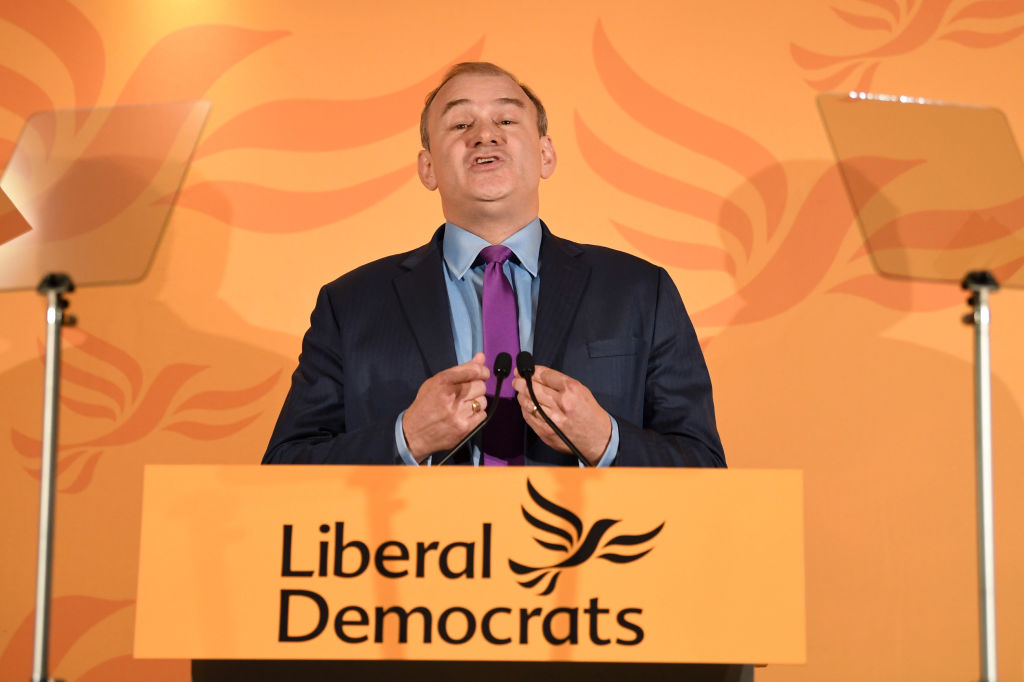The Liberal Democrats are putting a motion to their virtual conference this weekend to end the party’s commitment to trying to rejoin the EU. This will annoy many of their activists. It will convince some pro-Europeans that the time to rip up their membership cards is now (and, for many others, to feel smug about having always doubted the party). So what’s the upside? There isn’t one. Instead, this is another in a long line of useless moves by the party, built on trying to get people who will never like the Lib Dems to change their minds.
To make matters worse, the motion is predictably wishy washy in what it sets out. It commits the party to ‘keep all options open’ in regard to Britain’s relationship with the EU. I’d almost have more respect for the party if the wording was ‘we think leaving the EU was the best thing that’s ever happened to Britain and we were wrong to oppose Brexit’. Instead, the Lib Dems are slithering away from their pro-EU commitment in gutless fashion.
This is part of a pattern for the Lib Dems. The thing that defines the party post-2015 more than anything else is their determination to be constantly defined by their enemies. Do those demanding this change think Leave voters will be wooed by this motion? If their answer to that is ‘yes’, then they are delusional; if the answer is ‘no’, then by default the motion is a complete waste of time. It’s like the Lib Dems have all got together and decided that what people really didn’t like about the Lib Dems at the last election was that they were too Remainery, as opposed to realising that their pro-EU position was feasibly the only reason almost anyone voted for them at all. The Lib Dems also behave as if they think those criticising their policy has only their best interests at heart. Really?
It reminds me heavily of what happened after the party got hammered at the 2015 general election. Instead of seeing that they were now the party of the coalition and that the legacy of that government was something they were going to be tied to for at least a generation, the Lib Dems thought they could try and convince everyone that they too had disliked the government all along themselves. As if they had somehow ended up in coalition with the Tories after getting too drunk at a party and wanted everyone to forgive their horrendous error. They couldn’t see that lots of people in the country actually liked that government and, had the Lib Dems flown the flag for it post-2015, many people who liked what followed a lot less might have formed a new core vote for the yellows.
Again, we see the Lib Dems stand up for something that gets them a lot of flak for several years – this time, that we should remain in the EU post-referendum – and then, having taken the hit for it, decide to throw away any banked advantage that could have come their way as a result. There are no rejoiner parties in the UK now. That’s a demographic the Lib Dems could have capitalised on if they had thought about it a little. But no, they must exorcise the demons of 2019, that’s what’s important to them.
They didn’t want to be the coalition party. They don’t want to be the pro-EU party any longer. That leads us to the inevitable question: what do the Lib Dems want to be then? With Ed Davey in charge, I suppose the plan is to try and appeal to soft Tory voters in the blandest way possible. The hope here presumably is that by the time the next general election rolls around enough people feel anti-Tory enough to want the Conservatives out, while also retaining their doubts about Starmer’s Labour party. Targeting such a pool of voters is a pretty bleak prospect for a political party; if it makes them happy, so be it. I still don’t see why they needed to change their EU policy to pursue this strategy. At the next election, the Lib Dems will have been proven right on Europe or no one will care anymore.
Many Lib Dems wish the party could go back to what it was in 2004. One way to do just that is for Davey to figure out why the party was relatively popular then – the Iraq war – and see that what people liked about the Lib Dems at the time was that they took a position and stuck to it, no matter how unpopular it was. There’s a lesson in that. But will the Lib Dems actually listen?







Comments